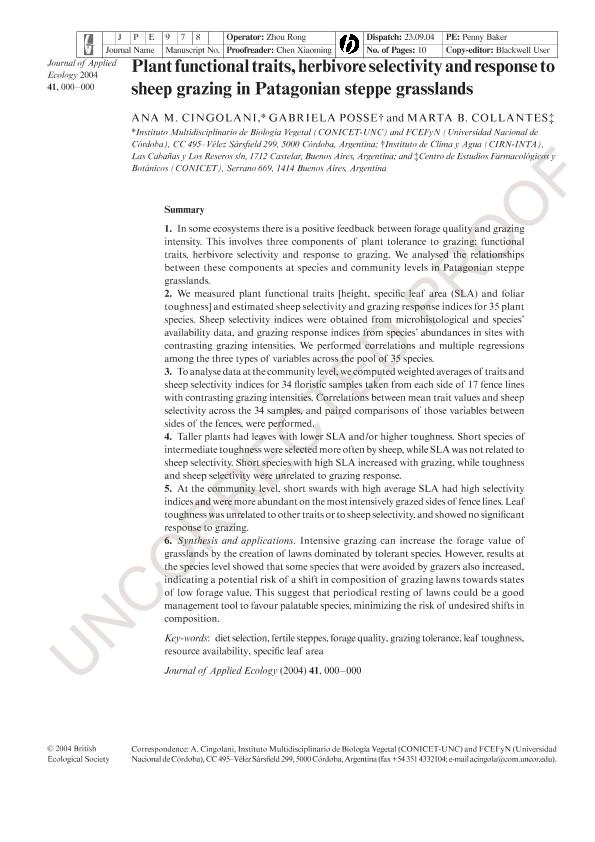Mostrar el registro sencillo del ítem
dc.contributor.author
Cingolani, Ana María

dc.contributor.author
Posse Beaulieu, Gabriela

dc.contributor.author
Collantes, Marta Beatriz

dc.date.available
2017-12-20T12:47:39Z
dc.date.issued
2005-02
dc.identifier.citation
Collantes, Marta Beatriz; Posse Beaulieu, Gabriela; Cingolani, Ana María; Plant functional traits, herbivore selectivity and response to sheep grazing in Patagonian steppe grasslands; Wiley Blackwell Publishing, Inc; Journal of Applied Ecology; 42; 1; 2-2005; 50-59
dc.identifier.issn
0021-8901
dc.identifier.uri
http://hdl.handle.net/11336/31085
dc.description.abstract
1. In some ecosystems there is a positive feedback between forage quality and grazing intensity. This involves three components of plant tolerance to grazing: functional traits, herbivore selectivity and response to grazing. We analysed the relationships between these components at species and community levels in Patagonian steppe
grasslands.
2. We measured plant functional traits [height, specific leaf area (SLA) and foliar
toughness] and estimated sheep selectivity and grazing response indices for 35 plant species. Sheep selectivity indices were obtained from microhistological and species availability data, and grazing response indices from species abundances in sites with contrasting grazing intensities. We performed correlations and multiple regressions among the three types of variables across the pool of 35 species.
3. To analyse data at the community level, we computed weighted averages of traits and sheep selectivity indices for 34 floristic samples taken from each side of 17 fence lines with contrasting grazing intensities. Correlations between mean trait values and sheep selectivity across the 34 samples, and paired comparisons of those variables between sides of the fences, were performed.
4. Taller plants had leaves with lower SLA and/or higher toughness. Short species of
intermediate toughness were selected more often by sheep, while SLA was not related to sheep selectivity. Short species with high SLA increased with grazing, while toughness and sheep selectivity were unrelated to grazing response.
5. At the community level, short swards with high average SLA had high selectivity
indices and were more abundant on the most intensively grazed sides of fence lines. Leaf toughness was unrelated to other traits or to sheep selectivity, and showed no significant response to grazing.
6. Synthesis and applications. Intensive grazing can increase the forage value of
grasslands by the creation of lawns dominated by tolerant species. However, results
from this study showed that some plant species that were avoided by grazers also
increased, indicating a potential risk of a shift in composition of grazing lawns
towards states of low forage value. This suggests that periodic resting of lawns could
be a good management strategy to favour palatable species, thereby minimizing the risk of undesirable shifts in the overall species composition.
dc.format
application/pdf
dc.language.iso
eng
dc.publisher
Wiley Blackwell Publishing, Inc

dc.rights
info:eu-repo/semantics/openAccess
dc.rights.uri
https://creativecommons.org/licenses/by-nc-sa/2.5/ar/
dc.subject
Diet Selection
dc.subject
Fertile Steppes
dc.subject
Specific Leaf Area
dc.subject.classification
Otras Ciencias Biológicas

dc.subject.classification
Ciencias Biológicas

dc.subject.classification
CIENCIAS NATURALES Y EXACTAS

dc.title
Plant functional traits, herbivore selectivity and response to sheep grazing in Patagonian steppe grasslands
dc.type
info:eu-repo/semantics/article
dc.type
info:ar-repo/semantics/artículo
dc.type
info:eu-repo/semantics/publishedVersion
dc.date.updated
2017-11-16T15:18:05Z
dc.identifier.eissn
1365-2664
dc.journal.volume
42
dc.journal.number
1
dc.journal.pagination
50-59
dc.journal.pais
Estados Unidos

dc.journal.ciudad
Hoboken
dc.description.fil
Fil: Cingolani, Ana María. Consejo Nacional de Investigaciones Científicas y Técnicas. Centro Científico Tecnológico Conicet - Córdoba. Instituto Multidisciplinario de Biología Vegetal. Universidad Nacional de Córdoba. Facultad de Ciencias Exactas Físicas y Naturales. Instituto Multidisciplinario de Biología Vegetal; Argentina
dc.description.fil
Fil: Posse Beaulieu, Gabriela. Instituto Nacional de Tecnología Agropecuaria. Centro de Investigación de Recursos Naturales. Instituto de Clima y Agua; Argentina
dc.description.fil
Fil: Collantes, Marta Beatriz. Consejo Nacional de Investigaciones Científicas y Técnicas. Oficina de Coordinación Administrativa Parque Centenario. Museo Argentino de Ciencias Naturales ; Argentina
dc.journal.title
Journal of Applied Ecology

dc.relation.alternativeid
info:eu-repo/semantics/altIdentifier/url/http://onlinelibrary.wiley.com/doi/10.1111/j.1365-2664.2004.00978.x/abstract
dc.relation.alternativeid
info:eu-repo/semantics/altIdentifier/doi/http://dx.doi.org/10.1111/j.1365-2664.2004.00978.x
Archivos asociados
